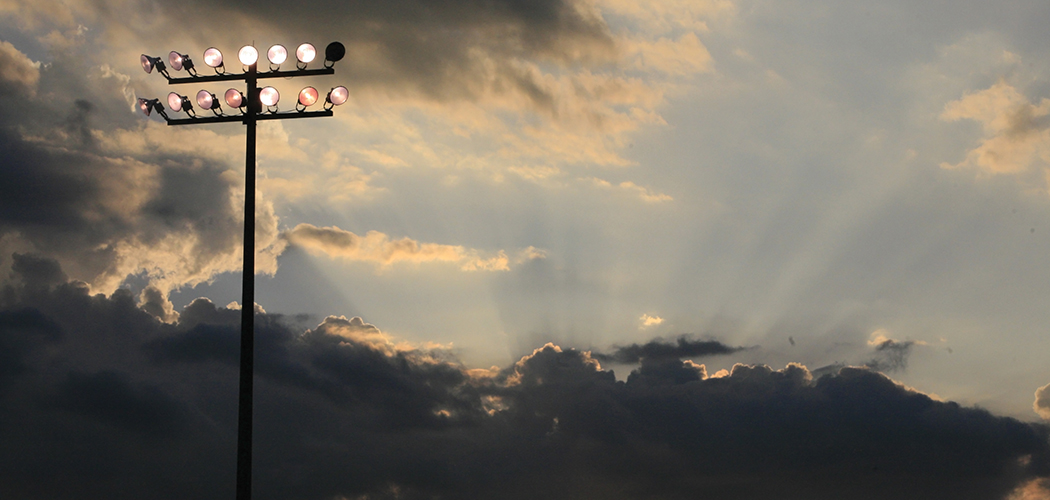[title subtitle=”words: Marla Cantrell”][/title]
The wind was blowing that night, lifting the edges of our skirts, tossing candy wrappers that tumbled end to end across the football field. The field was empty except for the debris, and the scoreboard blinked a row of zeroes in a way that was dizzying if you watched it for too long. There were four of us that night—there were always four of us—and we were wearing knee-high boots and too much eyeliner. Our hair was long and wild, as if we’d just climbed out of bed. We could have passed for twenty, though none of us was older than seventeen.
“It feels like the end of something,” Kate said, and she pointed to the empty field where forty minutes before our football team, the Alma Airedales, had crushed our biggest rival, the Van Buren Pointers.
“This time next year,” I said, “we’ll all be somewhere else.”
Miller was tapping a spot near her collarbone, a habit she’d had since the day I met her, when she’d transferred to Alma in the ninth grade. Her nails were painted burgundy, and she looked like Cleopatra, even in the boots and the white T-shirt with a red satin apple that stretched across the spot where her heart beat. “When we moved here, my dad said we wouldn’t stay more than a year.” She stopped, her gaze fixed on the visitors’ bleachers, although no one was there. “And then Mom left,” Miller said. The wind whipped her long hair across her face, and for a moment she was hidden by the darkness of it. “But then I met the three of you.” Her voice broke on the word ‘three,’ and I felt something tighten in my chest.
Nina stood on one foot, like a flamingo, I thought. “Let’s get out of here,” she said. Nina glanced at her watch—it was a guy’s watch and she’d yet to tell us where she’d gotten it, although we’d all asked. “I have to be home by midnight.” She shook her head. “Midnight. Can you believe it?”
We cranked up the heat in Miller’s car. We were always cold back then, our bodies waif-like from too many diets, too much time spent in front of tall mirrors and fashion magazines. We turned on the radio. Otis Redding came on, and then Neil Young, and then Creedence Clearwater Revival singing a song that asked who would stop the rain. Miller put on another layer of lip gloss, eyed herself in the rearview mirror, frowned.
Her car was old and loud, and Miller drove like she was punishing it. We passed the one cop in town, waved as we flew by, and he flashed his lights but didn’t move. On the highway, Miller let it go, and we caught air on the stretch of road that curved back and forth across the dark mountain.
Nina was beside me, and when the headlights of an oncoming car flashed across her face, I stole a look. Her eyes were the green of gemstones. Her hair so black it looked unreal. I watched Miller’s hand on the steering wheel. Every finger had a ring. Beside her, Kate sat, the air from the heater moving her hair, lifting it like a red silk scarf caught on a wind current.
“Where are we going?” I asked, and Miller shrugged. Kate reached across the seat, squeezed my knee. “Lake Fort Smith,” she said, and then looked at Miller to make sure. “Right?” Kate asked and Miller nodded.
Clouds hung low in the sky, hiding the moon. When we came to a stop, there was the sound of the spillway rushing below us, thousands of gallons of water screaming across the rocks. When we spoke, our voices barely sounded above the noise.
We grabbed our coats and walked to the cliff where slabs of limestone rock jutted out below in shallow ledges here and there. “Let’s climb down,” Kate called out, and already she was moving closer, sitting down finally, her tall boots hanging over the edge.
“That’s how people die.” I said, and I kneeled down beside her. Kate said, “Don’t be such a drag.”
Miller walked back to the car, started the motor, flicked on the headlights that threw light across all of us. In the glare of the headlights, we could see the water crashing across the rocks. Kate looked at Miller, and then down below. She scooted back to safe ground and spun around so that her back was to the spillway, and I sat down beside her. Nina and Miller stood just feet away.
“I’m not going back to school on Monday,” Nina said. She had her arms crossed tight. Her hip jutted out. She looked like a young Elizabeth Taylor standing there, her dark hair billowing, one eyebrow arched just so.
“Of course you are,” Miller said, but Nina shook her head no.
“And I’m not going back on Tuesday,” Nina said. “Or any other day.” On her right hand she wore her senior ring, the stone icy blue even though our school colors were green and gold. We’d already planned our graduation trip to Gulf Shores. Already had our senior pictures taken. “There’s this guy who wants me to leave with him,” she said, and I saw her twisting the man’s watch on her wrist. It was so loose it could have easily slipped off.
“There’s always a guy,” I said. “No reason to lose your mind over it.”
Kate said, “I get it. If I had a guy waiting, I’d leave this town in the dust.” I was so close to her, I could smell the smoke from the wood stove that heated her house and seeped into every outfit she wore after September.
“Who is it?” Miller asked.
“I can’t say,” Nina said. Miller covered her eyes with her hand and said, “You’re breaking my heart.”
There was a maple tree that caught the light from Miller’s car, and as the wind moved, at least a dozen leaves fell. They were the color of autumn, the color of Kate’s hair when the sun hit it. “I’m breaking my own heart,” Nina said, “but I can’t help it.”
Miller lifted her arms like she was directing a choir. “This was supposed to be our year!” Miller said, her affinity for drama showing in every syllable. “You and me and Kate and Jennie. Our last year. Next year, you can take off with anybody you want and I won’t say a word. I promise.”
Kate had taken my hand, and she held it between her own hands and I could feel her trembling. “We have this moment. This right now. But nothing else. Ask for too much, Miller, and you’ll get slapped down! You might as well figure that out now.”
Kate’s older brother had drowned the year before at Frog Bayou in Rudy. In two years’ time, her younger brother would be swallowed up by the Arkansas River after his fishing boat capsized.
“Do you love him?” Miller asked Nina, and Nina laughed. “Of course not,” she said, “but I’m going with him anyway. Mama loves Daddy, and you see how that works out. They fight like ninety percent of the time.”
Miller pulled her coat tighter around her. “So you think not loving this guy is going to save you somehow?”
Nina lifted her chin. “I do.”
“Then you’re an idiot, Nina.”
I stepped in then. “Enough, Miller. It’s not your life. It’s nobody’s life but Nina’s.”
Kate dropped my hand and stood up. “I joined a club,” she said, and I pulled away. The four of us didn’t join anything. Not choir or band or drama or the yearbook staff. We didn’t want our classmates to define us by anything but our friendship with one another. “You did what now?” I asked.
“I joined the Science Club. We meet during sixth period. We think there’s life on Mars. We found this photo that looks like there’s water there,” She stood a little taller. “And we think we can prove it.”
Nina got up, brushed off her skirt. It was black like her boots, and short, and perfect. “Kate is looking for life on Mars, Miller. Do you think she’ll find it?”
“No,” Miller said. “I don’t. I think Kate’s been listening to too much Elton John. All those rocket men and rocket women.” Miller laughed, but the laugh was hollow.
Nina lifted her chin. “Do you think we’ll be friends in a year?”
Miller ignored her. “Mom calls sometimes,” she said. “Late at night. Early, early morning. I pick up the phone when Dad’s not around. She cries a lot. It’s not the same as an apology.”
“Maybe she didn’t know how to stay,” Nina said. “Staying is hard.”
Miller wiped her eyes. “How far are you going?”
“Tulsa.”
“And you’ll come back sometimes?”
“Sure I will. After things settle down.”
Kate took a step backward, teetered, and for a minute I imagined what it would be like to see her sailing over the edge. I grabbed her wrist and pulled her back and held her close. In five years Kate would get a diagnosis she couldn’t come back from. If I’d known that then, I might never have let her go.
Grabbing Kate, pulling her back, happened in the time it would take you to blink, but it’s what I remember most from that night. Not Nina. Nina was like the center of the earth, all iron and fire. She would always be fine.
In the car, Miller switched on the radio. Nina looked at her big watch. “It’s fifteen minutes till midnight,” she said, and Miller sped up. Nina was a girl of contradictions. She couldn’t be late for anything, even if she was planning to slip out of her bed later, crawl out the window, slip away into a brand new life.
The rain started, soft and then furious. At Nina’s house, I looked at the mums planted in a circle around the concrete birdbath: rust-colored, orange, purple. Nina said, “I love you all, I really do.” And then she slipped out of the car, the hood of her coat pulled up against the rain. When I looked back she was still standing at her front door under the yellow porch light, her hand raised to us. It was not lost on me that Nina was the one standing still and we were the ones moving away.
On the drive to Kate’s house, we didn’t talk at all. Above us, Mars sat, as red as an apple, and possibly as wet as the road we were driving. I imagined rivulets of water running down red craters, pooling in red ponds, big-headed green Martians bathing as we drove the back roads of Arkansas. I watched Kate stare out the car’s window, this C student I loved, who might one day prove something NASA denied was true. At least she believed in something, I thought. At least she believed.




